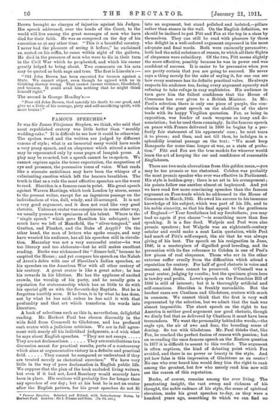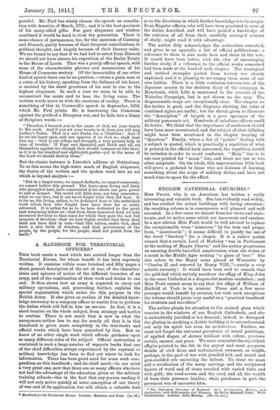FAMOUS SPEECHES.*
IT was Sir James Fitzjames Stephen, we think, who said that most republished oratory was little better than " mouldy _wedding-cake." It is difficult to see how it could be otherwise. The spoken word and the written are judged by different canons of style ; what is an immortal essay would have made a very prosy speech, and an eloquence which stirred a nation may be represented only by some pages of lumpish prose. A play may be re-acted, but a speech cannot be re-spoken. We cannot capture again the tense expectation, the magnetism of eye and presence, the persuasive tones of voice. What reads like a staccato anticlimax may have been the whisper of a culminating emotion which left the bearers breathless. The truth is that as a rule the most effective speeches are the worst to read. Sheridan is a famous case in point. His great speech against Warren Hastings, which took London by storm, seems to the present writer, except for an ingenious passage on the individualism of vice, dull, windy, and ill-arranged. It is not a very good argument, and it does not read like very good rhetoric. Unless an orator was conspicuous in some other way, we usually possess few specimens of his talent. Where is the "single speech" which gave Hamilton his sobriquet; how much have we left of Mansfield, the " silver-tongued," and Grattan, and Plunket, and the Duke of Argyll ? On the other hand, the man of letters who spoke essays, and may have wearied his audience, has all his speeches still in circula- tion. Macaulay was not a very successful orator—he was too literary and too elaborate—but he still makes excellent reading. Burke was nicknamed the " dinner-bell," because he emptied the House ; and yet compare his speech on the Nabob of Arcot's debts with one of Sheridan's Indian speeches, or his speeches on the American War with all other oratory of his century. A great orator is like a great actor; he has his rewards in his lifetime. He has the applause of excited crowds, the worship of his party, and he usually gets a reputation for statesmanship which has as little to do with his special gift as with the Seventh-day Baptists. But he is forgotten terribly soon. If he lives, it is by what he has done, not by what he has said, unless he has said it with that profundity and that art which transform his words into literature.
A book of selections such as this is, nevertheless, delightful reading. Mr. Herbert Paul has chosen discreetly in the wide field from Cromwell to Gladstone, and has prefaced each orator with a judicious criticism. We are in full agree- ment with nearly all his individual judgments, and with what
he says about English speeches. "They are not essays
They are not declamations They are contributions to a
discussion meant for practical results, parts of a controversy which aims at argumentative victory in a definite and practical field They cannot be compared or understood if they are treated merely as rhetorical exercises." We have very little in the way of pure declamation in English public life. We suppose that the plan of the book excluded living writers, but even if it had not, Lord Rosebery would scarcely have been in place. His orations will probably live far longer than any speeches of our day ; but at his best he is not an orator after the English pattern, for his great speeches do not fit
• Famous Speeches. Selected and Edited, with Introductory Notes, dlerbert Paul. London : Sir L Pitman and Sons. f7a. 6d. net.]
by
into an argument, but stand polished and isolated,—pillars rather than stones in the wall. On the English definition, we should be inclined to put Pitt and Fox at the top in a class by themselves. They can still be read with pleasure by those who delight in a well-ordered argument expressed in the most adequate and final words. Both were eminently persuasive; both had the solid substance of reason, to which all their flights of eloquence were subsidiary. Of the two, Pitt seems slightly the more effective, possibly because he was in power and was confident of success. It is easier to be persuasive when yon are pretty certain that you are going to succeed. He never says a thing merely for the sake of saying it, for one can see how every sentence has its definite practical value. He always respects his audience too, facing every argument squarely and refusing to take refuge in easy sophistries. His audience in turn gave him the fullest confidence that the House of Commons has ever given to a British Minister. In Mr. Paul's selection there is only one piece of purple, the con- clusion of the great speech on the abolition of the slave trade with its happy Virgilian quotation. For, as being in opposition, was fonder of such weapons as irony and de- nunciation; but he used them cunningly. In the famous speech on peace with France delivered in 1800 he begins by a per• fectly fair statement of his opponents' case ; be next tears it to pieces; and then, and not till then, he indulges in a splendidly ironical passage on the text " We must keep Bonaparte for some time longer at war, as a state of proba- tion." Pitt and Fox are the true models for whoever would learn the art of keeping the ear and confidence of reasonable Englishmen.
There are two main aberrations from this golden mean,—you may be too prosaic or too rhetorical. Cobden was probably the most prosaic speaker who ever was effective in Parliament. His style is hodden-grey; there is no art in his arrangement; his points follow one another almost at haphazard. And yet we have read few more convincing speeches than the famous argument on Free-trade which he addressed to the House of Commons in March, 1845. He owed his success to his immense knowledge of his subject, which was part of his life, and to his noble sincerity, so that his final appeal to the gentlemen of England—" Your forefathers led my forefathers; you may lead us again if you choose "—is something more than fine speaking. It is a fine deed. Walpole and Peel were also prosaic speakers ; but Walpole was an eighteenth-century scholar and could make a neat Latin quotation, while Peel had much of Pitt's self-respect, the air that he was always giving of his best. The speech on his resignation in June, 1846, is a masterpiece of dignified good breeding, and its peroration with its fine reference to Cobden is one of Peel's few pieces of real eloquence. Those who err in the other extreme suffer cruelly from the difficulties which attend a reputation for oratory. For half of good rhetoric is voice and manner, and these cannot be preserved. O'Connell was a great orator, judging by results ; but the specimen given here is tawdry and prolix. Lowe's speech on the Franchise Bill of 1866 is still of interest; but it is thoroughly artificial and self-conscious. Sheridan is frankly unreadable. But the hardest cases are Chatham and Gladstone, orators with much in common. We cannot think that the first is very well represented by the selection, bat we admit that the task was almost impossible. The short speech on the right to tax America is neither good argument nor good rhetoric, though we dimly feel that as delivered by Chatham it must have been tremendous. We want the personality behind the words,—the eagle eye, the air of awe and fear, the brooding sense of destiny. So too with Gladstone. Mr. Paul thinks that, like Fox, he reached the perfect fusion of reason with passion; but on re-reading the once famous speech on the Eastern question in 1877 it is difficult to assent to this verdict. The argument is often captious, the kind of debating point which Fox avoided, and there is no power or beauty in the style. And yet how false is this impression of Gladstone as an orator! No one who ever heard him would deny him the right to rank among the greatest, but few who merely read him now will see the reason of this reputation.
Burke, of course, remains among the ever living. The penetrating insight, the vast sweep and richness of bra thought, the noble cadence of his style, the sense of spiritual elevation, make his great speeches to-day, as they were a hundred years ago, something to which we can find no
parallel. Mr. Paul has wisely chosen the speech on concilia- tion with America of March, 1775 ; and it is the best specimen of his many-sided gifts. For pure eloquence and wisdom combined it would be hard to rival the peroration. There is some chance of permanence, too, for the speeches of Canning and Disraeli, partly because of their frequent contributions to political thought, and largely because of their literary value. We are bound to say that if we had had to select from Disraeli
we should not have chosen his exposition of the Berlin Treaty in the House of Lords. That was a purely official speech, with none of the characteristic phrases and mannerisms of his House of Commons oratory. Of the immortality of one other kind of speech there can be no question,—where a plain man at a crisis of his history, speaking from the fullness of his heart, is enabled by the sheer greatness of his soul to rise to the highest eloquence. In such a case we seem to be able to reconstruct the scene and to hear the living voice. The written words move us with the emotions of reality. There is something of this in Cromwell's speech in September, 1656, which Mr. Paul prints. He is heartening the Commons
against the perils of a European war, and he falls into a litany of Scripture words :—
"Therefore I beseech you in the name of God, set your hearts to His work. And if you set your hearts to it, then you will sing Luther's Psalm. That is a rare Psalm for a Christian ! And if he set his heart open, and can approve it to God, wa shall hear him say : ' God is our refuge and strength, a very present help in time of trouble.' If Pope and Spaniard, and Devil and all, set themselves against us—though they should 'compass us like bees,' as it is in the hundred and eighteenth psalm—yet in the name of the Lord we should destroy them."
But the classic instance is Lincoln's address at Gettysburg. To us this seems the high-water mark of English eloquence, the fusion of the written and the spoken word into an art which is beyond analysis
"But in a larger sense, we cannot dedicate, we cannot consecrate, we cannot hallow this ground. The brave men, living and dead, who struggled here, have consecrated it far above our poor power to add or detract. The world will little note, nor long remember, what we say here, but it can never forget what they did here. It is for us, the living, rather, to be dedicated here to the unfinished work which they who fought here have thus far so nobly advanced. It is rather for us to be here dedicated to the great task remaining before us—that from these honoured dead we take increased devotion to that cause for which they gave the last full measure of devotion—that we here highly resolve that these dead shall not have died in vain—that this nation, under God, shall have a new birth of freedom, and that government of the people, by the people, for the people, shall not perish from the earth"











































 Previous page
Previous page